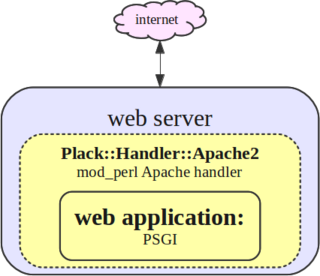
An integrated development environment (IDE) is a software application that provides comprehensive facilities to computer programmers for software development. An IDE normally consists of at least a source code editor, build automation tools and a debugger. Some IDEs, such as NetBeans and Eclipse, contain the necessary compiler, interpreter, or both; others, such as SharpDevelop and Lazarus, do not.

Perl is a family of two high-level, general-purpose, interpreted, dynamic programming languages. "Perl" refers to Perl 5, but from 2000 to 2019 it also referred to its redesigned "sister language", Perl 6, before the latter's name was officially changed to Raku in October 2019.
PHP is a general-purpose scripting language that is especially suited to web development. It was originally created by Danish-Canadian programmer Rasmus Lerdorf in 1994; the PHP reference implementation is now produced by The PHP Group. PHP originally stood for Personal Home Page, but it now stands for the recursive initialism PHP: Hypertext Preprocessor.

WebGUI is an open-source content management system written in Perl and released under the GNU General Public License.
The Web Server Gateway Interface is a simple calling convention for web servers to forward requests to web applications or frameworks written in the Python programming language. The current version of WSGI, version 1.0.1, is specified in Python Enhancement Proposal (PEP) 3333.
In computing, a solution stack or software stack is a set of software subsystems or components needed to create a complete platform such that no additional software is needed to support applications. Applications are said to "run on" or "run on top of" the resulting platform.

LAMP is a very common example of a web service stack, named as an acronym of the names of its original four open-source components: the Linux operating system, the Apache HTTP Server, the MySQL relational database management system (RDBMS), and the PHP programming language. The LAMP components are largely interchangeable and not limited to the original selection. As a solution stack, LAMP is suitable for building dynamic web sites and web applications..

Catalyst is an open source web application framework written in Perl, that closely follows the model–view–controller (MVC) architecture, and supports a number of experimental web patterns. It is written using Moose, a modern object system for Perl. Its design is heavily inspired by such frameworks as Ruby on Rails, Maypole, and Spring.
A webform, web form or HTML form on a web page allows a user to enter data that is sent to a server for processing. Forms can resemble paper or database forms because web users fill out the forms using checkboxes, radio buttons, or text fields. For example, forms can be used to enter shipping or credit card data to order a product, or can be used to retrieve search results from a search engine.

JADE is a proprietary object-oriented software development and deployment platform product from the New Zealand-based Jade Software Corporation, first released in 1996. It consists of the JADE programming language, Integrated development environment and debugger, integrated application server and object database management system.

JavaFX Script was a scripting language designed by Sun Microsystems, forming part of the JavaFX family of technologies on the Java Platform.
A scripting or script language is a programming language for a special run-time environment that automates the execution of tasks; the tasks could alternatively be executed one-by-one by a human operator. Scripting languages are often interpreted, rather than compiled.

Rack is a modular interface between web servers and web applications developed in the Ruby programming language. With Rack, application programming interfaces (APIs) for web frameworks and middleware are wrapped into a single method call handling HTTP requests and responses.

Plack is a Perl web application programming framework inspired by Rack for Ruby and WSGI for Python, and it is the project behind the PSGI specification used by other frameworks such as Catalyst and Dancer. Plack allows for testing of Perl web applications without a live web server.

Opa is an open-source programming language for developing scalable web applications.
The following outline is provided as an overview of and topical guide to the Perl programming language:

The Xojo programming environment and programming language is developed and commercially marketed by Xojo, Inc. of Austin, Texas for software development targeting macOS, Microsoft Windows, Linux, iOS, the Web and Raspberry Pi. Xojo uses a proprietary object-oriented language.
Flutter is an open-source UI software development kit created by Google. It is used to develop applications for Android, iOS, Linux, Mac, Windows, Google Fuchsia and the web from a single codebase.











